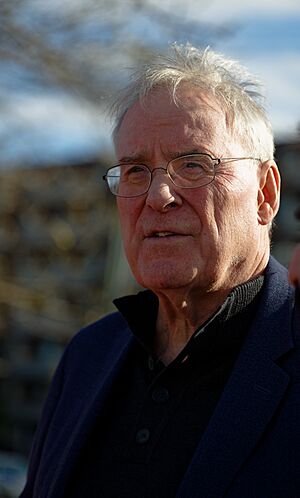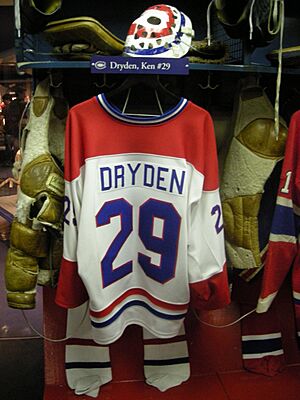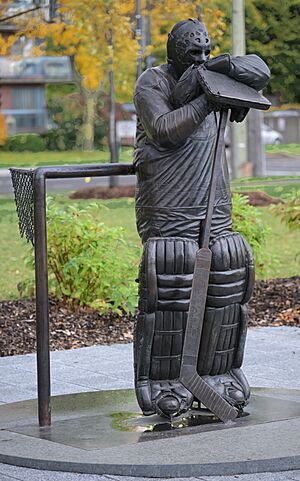Ken Dryden facts for kids
Quick facts for kids Ken DrydenPC OC |
|||
|---|---|---|---|
| Hockey Hall of Fame, 1983 | |||

Dryden in October 2023
|
|||
| Born | August 8, 1947 Hamilton, Ontario, Canada |
||
| Died | September 5, 2025 (aged 78) | ||
| Height | 6 ft 4 in (193 cm) | ||
| Weight | 205 lb (93 kg; 14 st 9 lb) | ||
| Position | Goaltender | ||
| Caught | Left | ||
| Played for | Montreal Canadiens | ||
| National team | |||
| NHL Draft | 14th overall, 1964 Boston Bruins |
||
| Playing career | 1970–1979 | ||
Kenneth Wayne Dryden (August 8, 1947 – September 5, 2025) was a famous Canadian. He was a professional hockey goaltender, a politician, a lawyer, a businessman, and an author. Ken Dryden played for the Montreal Canadiens in the National Hockey League (NHL) from 1971 to 1979. During his time, he helped his team win the Stanley Cup six times. He also won the Vezina Trophy five times as the best goaltender. He received the Conn Smythe Trophy as the most valuable player in the playoffs and the Calder Memorial Trophy as the best rookie. He was added to the Hockey Hall of Fame in 1983. Later, Dryden became a politician, serving as a Member of Parliament from 2004 to 2011. He was also the Minister of Social Development from 2004 to 2006. In 2017, the NHL named him one of the 100 Greatest Players of all time. He received the Order of Hockey in Canada in 2020.
Contents
Ken Dryden: Hockey Legend and Leader
Early Life and Learning
Ken Dryden was born in Hamilton, Ontario, in 1947. His parents were Murray and Margaret Dryden. He had a sister named Judy and a brother named Dave. Dave also became a goaltender in the NHL. Ken grew up in Islington, Ontario, which was a suburb of Toronto. He played junior hockey for local teams like the Etobicoke Indians.
The Boston Bruins team chose Dryden in the 1964 NHL draft. A few days later, Boston traded him to the Montreal Canadiens. Dryden later found out he was first drafted by the Bruins, not the Canadiens.
College Hockey Star
Instead of playing for the Canadiens right away, Dryden went to Cornell University. He studied history there and played college hockey until 1969. He led the Cornell Big Red team to win the 1967 National Collegiate Athletic Association championship. He also won three ECAC tournament championships. Dryden won 76 out of 81 games he started in college. He also played for the Canadian national team in the 1969 World Ice Hockey Championships.
Dryden took a break from the NHL during the 1973–74 season. He wanted to finish his law degree. He earned his law degree from McGill University in 1973.
Cornell University honored Dryden by retiring his jersey number 1 on February 25, 2010. He is one of only two players to have their numbers retired by Cornell's hockey team.
Amazing Hockey Career
Dryden played his first NHL game on March 14, 1971, against the Pittsburgh Penguins. The Canadiens won 5–1, and Dryden stopped 35 of 36 shots. On March 20, 1971, he played against his brother, Dave Dryden. Dave was a backup goalie for the Buffalo Sabres. This was the only time in NHL history that two brothers faced each other as goalies.
Dryden joined the Canadiens late in the 1970-71 season. He played only six regular-season games. But he had a great average of only 1.65 goals allowed per game. This helped him become the starting goalie for the playoffs. He then led the Canadiens to win the Stanley Cup. He also won the Conn Smythe Trophy as the most valuable player in the playoffs. He helped the Canadiens win the Stanley Cup five more times: in 1973, 1976, 1977, 1978, and 1979.
Rookie Success and Unique Records
The next year, Dryden won the Calder Memorial Trophy as the best rookie. He could not win it the previous year because he had not played enough regular-season games. He is the only player to win the Conn Smythe Trophy before winning the rookie of the year award. He is also the only goalie to win both the Conn Smythe and the Stanley Cup before losing a regular-season game. In 1972, Dryden played for Team Canada in the 1972 Summit Series against the Soviet Union.

Dryden played from 1971 to 1979. He took a break during the entire 1973–74 season. He felt his contract with the Canadiens was not fair for his achievements. He announced he would work for a law firm for a year. The Canadiens allowed many more goals that season without him. Dryden used that year to finish his law degree. He retired from hockey for good on July 9, 1979.
A Short but Brilliant Career
Dryden's NHL career was quite short, lasting just over seven full seasons. Despite this, his statistics were amazing. He had a 74.3% winning percentage. His goals-against average was 2.24, and his save percentage was 92.2%. He had 46 shutouts and 258 wins in only 397 NHL games. He won the Vezina Trophy five times. This award went to the goalie on the team that allowed the fewest goals. In 1998, The Hockey News ranked him number 25 on their list of the 100 Greatest Hockey Players. This was a huge honor for someone with a short career.
Dryden was very tall, standing 6 feet, 4 inches. During breaks in play, he would lean on his stick. This became his famous pose. People called him the "four-storey goalie." Boston Bruins star Phil Esposito once called him "that thieving giraffe." This was because of Dryden's skill and height.
Dryden was inducted into the Hockey Hall of Fame in 1983. His jersey number 29 was retired by the Canadiens on January 29, 2007. He was also inducted into the Ontario Sports Hall of Fame in 2011.
Life After Playing Hockey
Becoming an Author
Dryden wrote one book during his hockey career, called Face-Off at the Summit. It was a diary about Team Canada in the 1972 series against the Soviet Union.
After retiring from hockey, Dryden wrote several more books. His book The Game (1983) was very popular. It was even nominated for a Governor General's Award. His book Home Game: Hockey and Life in Canada (1990) became a TV documentary series. He also wrote In School: Our Kids, Our Teachers, Our Classrooms (1995) about Canada's education system. In 2019, he published Scotty: A Hockey Life Like No Other. This book was about his Canadiens coach, Scotty Bowman.
Broadcasting and Sports Management
Dryden worked as a TV hockey commentator for the Winter Olympics in 1980, 1984, and 1988. He was a commentator for ABC's coverage of the famous "Miracle on Ice" game.
In 1997, Dryden became the president of the Toronto Maple Leafs hockey team. He also spoke at the Open Ice Summit in 1999. This meeting discussed ways to improve hockey in Canada. He urged people to stop abusing on-ice officials. He warned that Canada would lose many referees each year if this continued. As a result, Hockey Canada started teaching about respecting game officials.
Dryden later became vice-chairman of Maple Leaf Sports & Entertainment. He left this role in 2004 to enter politics.
Sharing Knowledge as a Teacher
In 2012, Dryden became a "Special Visitor" at McGill University. He taught a course about issues facing Canada's future.
Serving in Politics
Dryden joined the Liberal Party of Canada and ran for the House of Commons in the 2004 federal election. He was chosen by Prime Minister Paul Martin to run in the Toronto area of York Centre. He won the election by a large number of votes. He was then named the Minister of Social Development.
Dryden was re-elected in the 2006 federal election. However, the Liberal Party lost the election. He then served as the health critic for his party.
Running for Party Leader
On April 28, 2006, Dryden announced he would run to become the leader of the Liberal Party of Canada. The party was choosing a new leader in December 2006. Many people thought he had a good chance because of his hockey fame. However, his campaign did not raise as much money as other candidates. He also had a quiet speaking style.
At the leadership convention, Dryden finished in fifth place on the first vote. He was eliminated on the second vote. He then supported Stéphane Dion, who went on to win the leadership. Dryden lost his seat in the House of Commons in the 2011 federal election.
Family and Legacy
Ken Dryden and his wife Lynda had two children and four grandchildren. His older brother, Dave, also played as a goalie in the NHL.
Ken Dryden passed away on September 5, 2025, after a battle with cancer. He was 78 years old.
Awards and Special Recognitions
Dryden received many hockey awards and honors:
| Award | Year | Remark |
|---|---|---|
| All-ECAC First Team | 1966–67, 1967–68, 1968–69 | |
| AHCA East All-American | 1966–67, 1967–68, 1968–69 | |
| ECAC Hockey All-Tournament First Team | 1967, 1968, 1969 | |
| NCAA All-Tournament First Team | 1967 | |
| NCAA All-Tournament Second Team | 1968, 1969 | |
| Conn Smythe Trophy winner | 1971 | |
| Calder Memorial Trophy winner | 1972 | |
| Vezina Trophy winner | 1973, 1976, 1977*, 1978*, 1979* | * Shared with Michel Larocque. |
| Stanley Cup champion | 1971, 1973, 1976, 1977, 1978, 1979 | |
| Playing NHL All-Star Games | 1972, 1975, 1976, 1977, 1978 | |
| Selected to NHL First All-Star Team | 1973, 1976, 1977, 1978, 1979. | |
| Selected to NHL Second All-Star Team | 1972 | |
| Inducted into the Hockey Hall of Fame | 1983 | |
| Number 26 on The Hockey News' list of the 100 Greatest Hockey Players | 1998 | |
| Number 29 was retired by the Montreal Canadiens | January 29, 2007 | |
| His number 1 was retired by the Cornell Big Red | February 25, 2010 | One of only two players to have his number retired by the Cornell hockey program, the other being Joe Nieuwendyk. |
| Recipient of the Order of Hockey in Canada | 2020 |
Dryden also received special honorary degrees from several universities:
| Honorary degree | University | Year | Remark |
|---|---|---|---|
| Honorary LL.D. degree | University of British Columbia | 1992 | |
| Honorary LL.D. degree | York University | 1996 | |
| Honorary LL.D. degree | University of Windsor | 1997 | |
| Honorary D.Univ. degree | University of Ottawa | 2000 | |
| Honorary LL.D. degree | Ryerson University | 2013 | |
| Honorary LL.D. degree | McGill University | 2018 | |
| Honorary LL.D. degree | University of Winnipeg | 2018 |
Career Statistics
Regular Season and Playoffs
| Regular season | Playoffs | ||||||||||||||||||||
|---|---|---|---|---|---|---|---|---|---|---|---|---|---|---|---|---|---|---|---|---|---|
| Season | Team | League | GP | W | L | T | MIN | GA | SO | GAA | SV% | GP | W | L | MIN | GA | SO | GAA | SV% | ||
| 1963–64 | Humber Valley Packers | MTHL | — | — | — | — | — | — | — | — | — | — | — | — | — | — | — | — | — | ||
| 1964–65 | Etobicoke Indians | MetJHL | — | — | — | — | — | — | — | — | — | — | — | — | — | — | — | — | — | ||
| 1966–67 | Cornell University | ECAC | 27 | 26 | 0 | 1 | 1646 | 40 | 4 | 1.46 | .945 | — | — | — | — | — | — | — | — | ||
| 1967–68 | Cornell University | ECAC | 29 | 25 | 2 | 0 | 1620 | 41 | 6 | 1.52 | .938 | — | — | — | — | — | — | — | — | ||
| 1968–69 | Cornell University | ECAC | 27 | 25 | 2 | 0 | 1578 | 47 | 3 | 1.79 | .936 | — | — | — | — | — | — | — | — | ||
| 1970–71 | Montreal Voyageurs | AHL | 33 | 16 | 7 | 8 | 1899 | 84 | 3 | 2.68 | — | — | — | — | — | — | — | — | — | ||
| 1970–71 | Montreal Canadiens | NHL | 6 | 6 | 0 | 0 | 327 | 9 | 0 | 1.65 | .957 | 20 | 12 | 8 | 1221 | 61 | 0 | 3.00 | .914 | ||
| 1971–72 | Montreal Canadiens | NHL | 64 | 39 | 8 | 15 | 3800 | 142 | 8 | 2.24 | .930 | 6 | 2 | 4 | 360 | 17 | 0 | 2.83 | .911 | ||
| 1972–73 | Montreal Canadiens | NHL | 54 | 33 | 7 | 13 | 3165 | 119 | 6 | 2.26 | .926 | 17 | 12 | 5 | 1039 | 50 | 1 | 2.89 | .908 | ||
| 1974–75 | Montreal Canadiens | NHL | 56 | 30 | 9 | 16 | 3320 | 149 | 4 | 2.69 | .906 | 11 | 6 | 5 | 688 | 29 | 2 | 2.53 | .916 | ||
| 1975–76 | Montreal Canadiens | NHL | 62 | 42 | 10 | 8 | 3580 | 121 | 8 | 2.03 | .927 | 13 | 12 | 1 | 780 | 25 | 1 | 1.92 | .929 | ||
| 1976–77 | Montreal Canadiens | NHL | 56 | 41 | 6 | 8 | 3275 | 117 | 10 | 2.14 | .920 | 14 | 12 | 2 | 849 | 22 | 4 | 1.55 | .932 | ||
| 1977–78 | Montreal Canadiens | NHL | 52 | 37 | 7 | 7 | 3071 | 105 | 5 | 2.05 | .921 | 15 | 12 | 3 | 919 | 29 | 2 | 1.89 | .920 | ||
| 1978–79 | Montreal Canadiens | NHL | 47 | 30 | 10 | 7 | 2814 | 108 | 5 | 2.30 | .909 | 16 | 12 | 4 | 990 | 41 | 0 | 2.48 | .900 | ||
| NHL totals | 397 | 258 | 57 | 74 | 23,330 | 870 | 46 | 2.24 | .922 | 112 | 80 | 32 | 6,846 | 274 | 10 | 2.40 | .915 | ||||
International
| Year | Team | Event | GP | W | L | T | MIN | GA | SO | GAA | |
|---|---|---|---|---|---|---|---|---|---|---|---|
| 1969 | Canada | WC | 2 | 1 | 1 | 0 | 120 | 4 | 1 | 2.00 | |
| 1972 | Canada | SS | 4 | 2 | 2 | 0 | 240 | 19 | 0 | 4.75 | |
| Senior totals | 6 | 3 | 3 | 0 | 360 | 23 | 1 | 3.83 | |||
See also
 In Spanish: Ken Dryden para niños
In Spanish: Ken Dryden para niños


